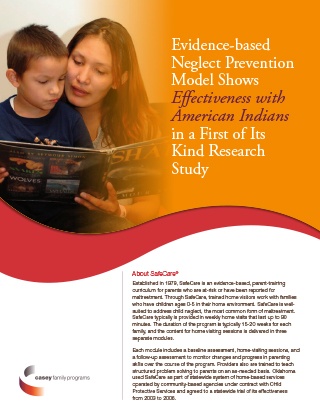SafeCare: Evidence-based Neglect Prevention Model Shows Effectiveness with American Indians
Established in 1979, SafeCare is an evidence-based, parent training curriculum for parents who are at-risk or have been reported for maltreatment. Through SafeCare, trained home visitors work with families who have children ages 0-5 in their home environment. SafeCare is well-suited to address child neglect, the most common form of maltreatment. SafeCare typically is provided in weekly home visits that last up to 90 minutes. The duration of the program is typically 15 to 20 weeks for each family, and the content for home visiting sessions is delivered in three separate modules. Each module includes a baseline assessment, home-visiting sessions, and a follow-up assessment to monitor changes and progress in parenting skills over the course of the program. Providers also are trained to teach structured problem solving to parents on an as-needed basis.
Collaboration with Casey Family Programs and Study Results
Casey Family Programs collaborated with the University of Oklahoma to examine the effectiveness of this model with American Indian families using a rigorous design from the statewide trial. Researchers found that SafeCare was equally effective at reducing child welfare recidivism among American Indian parents as it was among other groups. In addition, American Indian parents receiving SafeCare reported reductions in depression and higher ratings of cultural competence, working alliance, and service quality and benefit than American Indian parents receiving services as usual. The study findings counteract concerns that manualized and structured evidence-based models may not be congruent with American Indian culture and, and thus, not as effective as other approaches.
This study consists of the largest American Indian sample in an experimental evaluation examining child welfare outcomes to date. The results demonstrate the effectiveness of SafeCare with American Indians, which counters some concerns about the cultural relevance of evidence-based interventions with manualized and standardized treatment approaches for this population. Given disproportionate representation of American Indian children in out-of-home placement, effective prevention models with this population are needed. This research contributes to that need and will hopefully stimulate greater attention to the spread and evaluation of evidence-informed and evidence-based programs with American Indian families.
